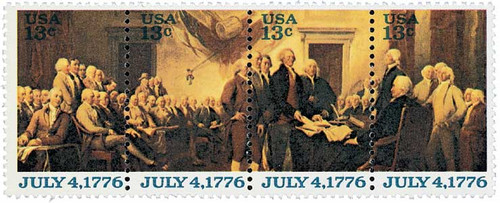
1976 13c Declaration of Independence: Hancock and Thomson
# 1694 FDC - 1976 13c Declaration of Independence: Hancock and Thomson
$2.00 - $3.20
U.S. #1694
1976 13¢ Hancock and Thomson
Declaration of Independence
Declaration of Independence
Issue Date: July 4, 1976
City: Philadelphia, PA
Quantity: 52,008,750
Printed By: Bureau of Engraving and Printing
Printing Method: Photogravure
Perforations: 11
Color: Blue and multicolored
John Hancock's signing of the Declaration of Independence at Independence Hall in Philadelphia, Pennsylvania. Hancock was the president and only member of the Continental Congress to sign the document on that date. The design reproduces a painting by John Trumbull (1756-1843).
The Bicentennial Series
The U.S. Bicentennial was a series of celebrations during the mid-1970s that commemorated the historic events leading to America’s independence from Great Britain. The official events began on April 1, 1975, when the American Freedom Train departed Delaware to begin a 21-month, 25,338-mile tour of the 48 contiguous states. For more than a year, a wave of patriotism swept the nation as elaborate firework displays lit up skies across the U.S., an international fleet of tall-mast sailing ships gathered in New York City and Boston, and Queen Elizabeth made a state visit. The celebration culminated on July 4, 1976, with the 200th anniversary of the adoption of the Declaration of Independence.
The U.S.P.S. issued 113 commemorative stamps over a six-year period in honor of the U.S. bicentennial, beginning with the American Revolution Bicentennial Commission Emblem stamp (U.S. #1432). As a group, the Bicentennial Series chronicles one of our nation’s most important chapters, and remembers the events and patriots who made the U.S. a world model for liberty.
U.S. #1694
1976 13¢ Hancock and Thomson
Declaration of Independence
Declaration of Independence
Issue Date: July 4, 1976
City: Philadelphia, PA
Quantity: 52,008,750
Printed By: Bureau of Engraving and Printing
Printing Method: Photogravure
Perforations: 11
Color: Blue and multicolored
John Hancock's signing of the Declaration of Independence at Independence Hall in Philadelphia, Pennsylvania. Hancock was the president and only member of the Continental Congress to sign the document on that date. The design reproduces a painting by John Trumbull (1756-1843).
The Bicentennial Series
The U.S. Bicentennial was a series of celebrations during the mid-1970s that commemorated the historic events leading to America’s independence from Great Britain. The official events began on April 1, 1975, when the American Freedom Train departed Delaware to begin a 21-month, 25,338-mile tour of the 48 contiguous states. For more than a year, a wave of patriotism swept the nation as elaborate firework displays lit up skies across the U.S., an international fleet of tall-mast sailing ships gathered in New York City and Boston, and Queen Elizabeth made a state visit. The celebration culminated on July 4, 1976, with the 200th anniversary of the adoption of the Declaration of Independence.
The U.S.P.S. issued 113 commemorative stamps over a six-year period in honor of the U.S. bicentennial, beginning with the American Revolution Bicentennial Commission Emblem stamp (U.S. #1432). As a group, the Bicentennial Series chronicles one of our nation’s most important chapters, and remembers the events and patriots who made the U.S. a world model for liberty.












